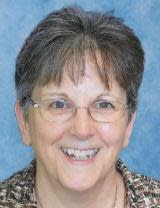'Use your words' is sound advice for the church and world
This Sunday, Oct. 29, is the final day of the Sixteenth Ordinary General Assembly of the Synod of Bishops, which opened at the Vatican on Oct. 4. In the face of the world’s many challenges, you might wonder whether 365 people sitting around tables in a cavernous Vatican meeting hall for three weeks are simply irrelevant, or — in words used by Mario Bergoglio just before he became Pope Francis —“self-referential.”
But today, in my congenitally hopeful state, I’ve begun to think those folks who’ve been doing not much more than talking to one another for three weeks may actually hold a key to the prevention of the world’s tragic devolution into hate, authoritarianism, and chaos.
Perhaps their model of contemplative listening and dialogue is just what the world needs now.

On a recent Friday evening, I sat in a roomful of women who were either raising or teaching children. Listening to their banter about the latest antics of preschoolers in their care, I heard the phrase “use your words.” This seems a helpful refrain for those responsible for transforming infants from the little monsters they can be into the self-controlled humans we hope they will become.
Just maybe, “use your words” can pull humanity back from the brink.
That’s what was happening at the Vatican this month. Heaven knows the Catholic Church has been responsible for its fair share of violence — both verbal and physical. But what synod-watchers have witnessed this month is a hopeful paradigm shift. At least one synod participant believes a new future is on its way. She said at a news conference “there is no turning back” from the synodal model of being church.
More: The horror of the Middle East violence shows the depth mankind can sink
Another of the synod participants, the dean of a U.S. Jesuit theological institute, said at a news conference last week "I remain convinced that the process is probably going to be more important than the outcome.” The synodal process is "a new way of being, where people, no matter who they are, no matter their status, station, or situation in the church, are … able to contribute to the process of discernment."
Those who are impatient for immediate change may be disappointed that none of the “hot-button” issues were resolved at this meeting. The word synod literally means “walking together” and denotes a process. The meeting that concludes this month is only one part of it. A year from now there will be a second synod assembly. After that, we may see some distinctive changes — but there is no way to predict what they will be.
For me, the beauty of the synod assembly is that at a time when there seems so little desire to reimagine our relationships with one another, our Earth, and the universe as interrelated and interdependent, that is exactly what happened in Rome this month.
While watching the synod from afar as I simultaneously mourn the suffering in our world, I am reminded of this wisdom from the Jesuit anthropologist and mystic Pierre Teilhard de Chardin’s work The Divine Milieu:
Let us try, patiently, to perceive the ocean of forces to which we are subjected and in which our growth is…steeped.… For the depth and universality of our dependence on so much altogether outside our control, all go to make up the embracing intimacy of our communion with the world to which we belong.”
There is, indeed, “so much altogether outside our control.”
Father Teilhard’s message is that this lack of control, once perceived, can orient us toward the truth that we are connected to one another and to all the forces of the universe in intimate communion. This realization cannot dawn on humanity soon enough.
Sister Beth Murphy, OP, is the director of communication for the Dominican Sisters of Springfield.
This article originally appeared on State Journal-Register: Dialogue and listening at the Synod of Bishops may be a model for all
